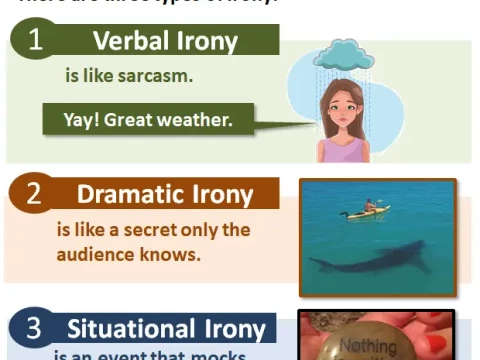irony
/ˈaɪrəni/📚 4383 189 2六级考研托福雅思Irony is a subtle form of humour that involves saying things that are the opposite of what you really mean. 讽刺
noun [抽象名词](出乎意料的)奇异可笑之处,具有讽刺意味的情况;反语,讽刺(with heavy irony / sarcasm)
If you talk about the irony of a situation, you mean that it is odd or amusing because it involves a contrast.
具有讽刺意味的事
adjective [原级]铁的;含铁的;似铁的
of, resembling, or containing iron
铁的; 似铁的; 含铁的
iron(铁) + y → 像铁一样冷冰冰的话 → 反话, 讽刺
单词造句:
n.反话,讽刺,讽刺之事
一丝讽刺(人类的言语、文字)
- There was a hint of irony / sarcasm in her voice.
| hint of irony | There was a hint of irony in his voice when he congratulated her.他祝贺她时,语气中带有一丝讽刺。 |
|---|---|
| trace of irony | She detected a trace of irony in his comment.她察觉到他的话里有一丝讽刺。 |
| touch of irony | His remark had a touch of irony that everyone noticed.他的言论带有一丝讽刺,大家都注意到了。 |
| hint of sarcasm | Her words had a hint of sarcasm that was hard to miss.她的话带有一丝讽刺,很难不注意到。 |
| trace of sarcasm | He spoke with a trace of sarcasm that made everyone laugh.他说话带有一丝讽刺,逗得大家笑了起来。 |
| touch of sarcasm | There was a touch of sarcasm in her tone when she replied.她回答时语气中带有一丝讽刺。 |
the irony of fate 命运的讽刺(不能使用 sarcasm)
- It's ironic that she became a teacher —she used to hate school.
- Ironically, his cold got better on the last day of his holiday.
